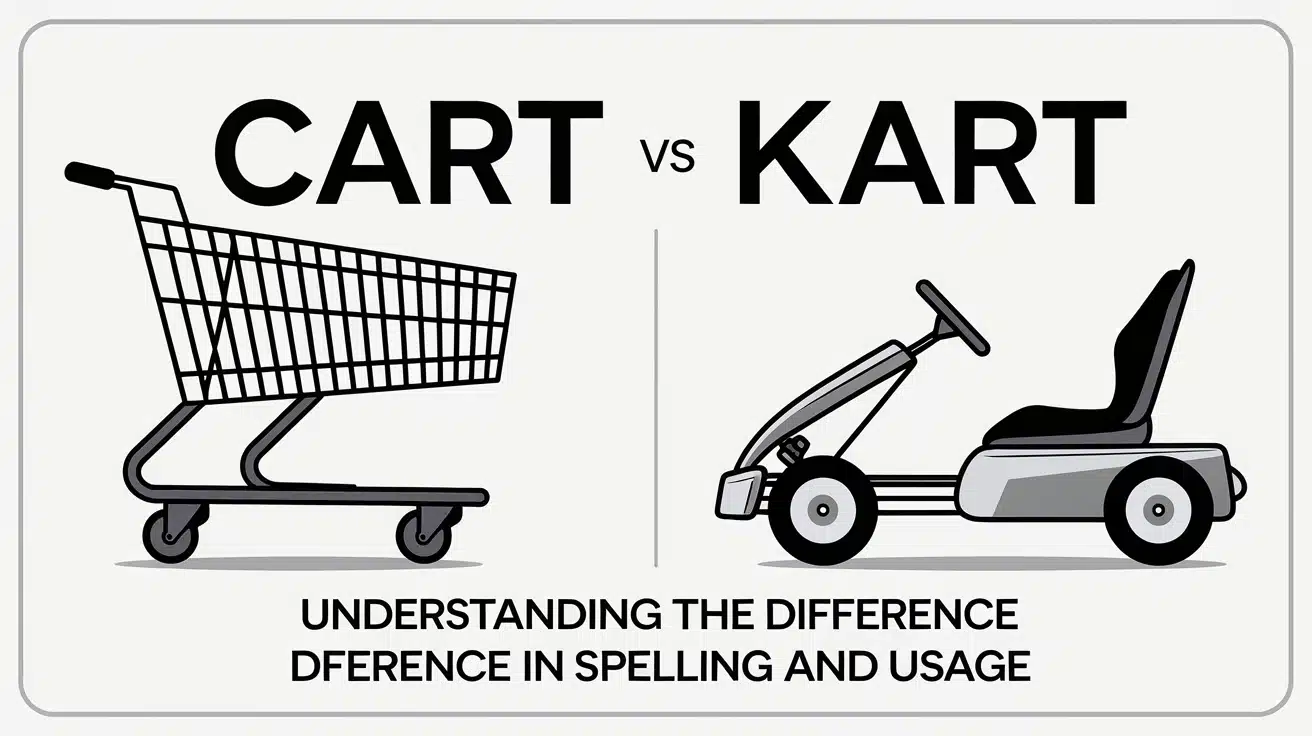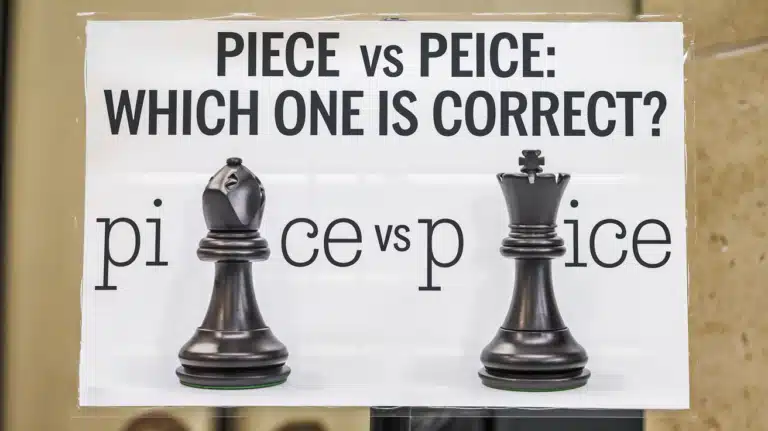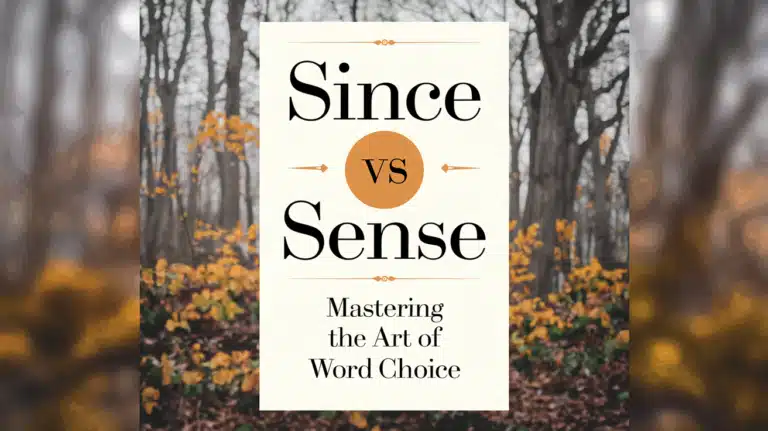Cart vs Kart: Decoding the Spelling Mystery
In the realm of language, certain words can cause confusion. “Cart” and “kart” are perfect examples. These homophones sound identical but carry distinct meanings and applications. Let’s explore the nuances of these terms, their origins, and their correct usage.
The Basics: Defining Our Terms
What exactly is a “cart”?
A cart, traditionally, is a vehicle designed for transporting goods. Imagine a horse-drawn cart trundling down a country lane, loaded with fresh produce. Over time, the term has significantly evolved.
In modern times, carts appear in various forms:
- Shopping carts in grocery stores
- Hand carts for moving heavy items
- Golf carts for course transportation
- Online shopping carts in e-commerce
The versatility of “cart” is noteworthy. It’s transitioned seamlessly from the physical world to the digital realm, maintaining its core meaning of transporting or holding items.
What’s a “kart”?
A kart has a more specific definition. It typically refers to a small, open-wheeled vehicle used for racing or recreational driving. The most famous example is the go-kart.
In recent years, the world of karting has evolved with the introduction of electric karts, offering a quieter and more environmentally friendly alternative to traditional gas-powered models. This shift is particularly evident in places like Electric Go-Karting Montreal, E-Karting Montreal, Indoor Karting Montreal, where enthusiasts can experience the thrill of racing in a modern, sustainable way. These electric karts provide the same adrenaline-pumping excitement while reducing noise and emissions, making them a popular choice for both seasoned racers and newcomers. As the popularity of electric karting continues to grow, it represents a significant step forward in the evolution of this beloved motorsport.
Go-karts are miniature racing cars, often seen racing around tracks at amusement parks or dedicated racing facilities. They’re characterized by:
- Small size
- Open frame body
- Four wheels
- Lack of suspension
- Emphasis on speed and agility
The term “kart” has also gained fame in the virtual world, thanks to the hugely popular Mario Kart video game series.
Read About : Hoodie or Hoody?which One is correct
Cart vs Kart: A Deep Dive into Differences
Spelling Origins
The word “cart” has ancient roots. It derives from Old Norse “kartr” and is related to the Old English “cræt.” These terms have existed for centuries, evolving alongside human transportation needs.
“Kart,” however, is a relatively new arrival. It’s a variant spelling that emerged in the mid-20th century, specifically to describe the small racing vehicles now known as go-karts.
Read More About : The Strange Plurals of ‘Ox’ and ‘Fox’: A Fun Language Adventure
Usage in Different English-Speaking Countries
While “cart” is universally recognized, the acceptance of “kart” varies:
| Country | “Cart” Usage | “Kart” Usage |
|---|---|---|
| USA | Common | Accepted for go-karts and racing |
| UK | Common | Less common, but recognized |
| Australia | Common | Gaining popularity, especially in racing contexts |
| Canada | Common | Accepted, particularly in motorsports |
Contexts and Connotations
When to use “cart”:
- Referring to traditional wheeled vehicles for transport
- Discussing shopping, both in-store and online
- In idiomatic expressions like “putting the cart before the horse”
When “kart” takes precedence:
- Talking about go-kart racing
- Referencing the Mario Kart video game series
- In brand names or trademarks related to racing karts
The Evolution of “Cart”
The journey of the word “cart” is fascinating. From horse-drawn carts to modern shopping carts, it’s adapted to changing times while maintaining its core meaning.
Historical Uses
- Agricultural carts: Used for centuries to transport crops and goods
- Horse-drawn carts: A common sight in pre-automobile era cities
- Hand carts: Utilized by street vendors and for moving goods short distances
Metaphorical Extensions
The versatility of “cart” has led to its use in various idioms:
- “Put the cart before the horse”: Doing things in the wrong order
- “Upset the apple cart”: Disturb the status quo
- “Hitch your wagon to a star”: Set high goals
Digital Age: The Online Shopping “Cart”
In the era of e-commerce, the concept of a cart has been digitized. The online shopping cart serves as a virtual holding area for items before purchase, mirroring its physical counterpart in brick-and-mortar stores.
The Rise of “Kart”
The term “kart” burst onto the scene in the 1950s, coinciding with the invention of go-karts.
Go-karts and the Racing World
Art Ingels, a hot rod car builder, is credited with creating the first go-kart in 1956. The sport quickly gained popularity, leading to:
- Dedicated racing tracks
- Professional kart racing leagues
- Use of “kart” as a distinct term in motorsports
Video Games: Mario Kart and Its Influence
Nintendo’s Mario Kart series, first released in 1992, has significantly impacted the popularity of the term “kart.” The game’s success has:
- Introduced millions to the concept of kart racing
- Cemented “kart” in pop culture vocabulary
- Led to real-world Mario Kart-themed attractions
Brand Names and Trademarks Using “Kart”
Many companies have embraced the “kart” spelling for branding:
- K1 Speed (indoor kart racing facilities)
- Razor Crazy Kart (drifting go-kart for kids)
- SuperKarts USA (karting sanctioning body)
Grammar Rules and Style Guides
Major dictionaries now include both “cart” and “kart,” recognizing their distinct uses. However, style guides often recommend using “cart” as the default spelling unless specifically referring to go-karts or similar racing vehicles.
“When in doubt, ‘cart’ is the safer choice for general use, while ‘kart’ should be reserved for specific racing contexts.” – The Chicago Manual of Style
Real-world Examples and Analysis
“Cart” in Literature and Media
- “The ox-cart man peddled his goods to the villages.” – Donald Hall, children’s book
- “He who is mounted on a swift cart, goes not faster than one on foot, who knows the way.” – Tibetan proverb
“Kart” in Pop Culture and Sports
- “Luigi was determined to win the Mario Kart tournament this year.”
- “The young driver showed promise in her first professional kart race.”
Misuses and Mixups: Common Pitfalls
Be cautious of contexts where the spellings are often confused:
- ❌ “She grabbed a shopping kart at the grocery store.”
- ✅ “She grabbed a shopping cart at the grocery store.”
- ❌ “He raced his go-cart around the track.”
- ✅ “He raced his go-kart around the track.”
Making the Right Choice
Context is Key: How to Decide Which Spelling to Use
Consider these factors:
- Subject matter: Racing or general transportation?
- Audience: Technical motorsports crowd or general public?
- Formality: Casual writing might allow more flexibility
Industry-specific Conventions
Different industries have their preferences:
- Retail: Always “shopping cart”
- Motorsports: “Kart” for racing vehicles
- Agriculture: “Farm cart” or “utility cart”
When in Doubt: Tips for Consistency
- Choose one spelling and stick to it throughout your document
- If referring to both concepts, clearly differentiate (e.g., “shopping carts and racing karts”)
- Consider your audience’s familiarity with the terms
The Future of “Cart” and “Kart”
As language evolves, so too might the usage of these terms. The rise of autonomous vehicles and delivery robots could introduce new contexts for “cart,” while virtual reality gaming might further popularize “kart” in digital realms.
Conclusion
The “cart” vs “kart” dilemma exemplifies how language adapts to new technologies and cultural phenomena. While “cart” remains the more versatile and widely accepted term, “kart” has carved out its niche in racing and gaming contexts.
Understanding the nuances between these spellings allows for more precise communication. Whether discussing online shopping carts or the latest Mario Kart tournament, choosing the right term ensures clear and contextually appropriate messages.
Remember, language is dynamic. As innovation continues in transportation and recreation, vocabulary will undoubtedly evolve alongside. Stay informed, and enjoy the linguistic journey – whether it’s in a cart or a kart!
FAQs
Q: Is “kart” just a misspelling of “cart”?
A: No, “kart” is a distinct spelling used specifically for small racing vehicles like go-karts.
Q: Can “kart” and “cart” be used interchangeably?
A: It’s best to use them in their specific contexts. “Cart” for general use, “kart” for racing contexts.
Q: What about “go-cart” vs. “go-kart”?
A: “Go-kart” is the correct spelling for the small racing vehicle. “Go-cart” is considered a misspelling.
Q: Are there other words with similar spelling variations?
A: Yes, words like “disk/disc” and “whiskey/whisky” also have variant spellings depending on context or region.







